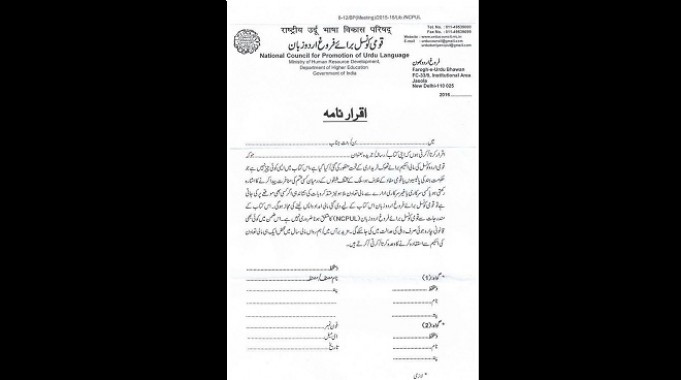Urdu, the Trojan horse?
“Then it was my bread, so I shaved it off. Now it is my language, my literature, my life. How can I remove it from my soul?” asked a friend of mine who writes poems and stories in Urdu. It cut to the quick. Days before, the National Council for the Promotion of the Urdu Language (NCPUL), an autonomous body under the Ministry of Human Resource Development, sent a ‘loyalty’ form to Urdu writers if they wished to avail themselves of the Council’s financial backing.
The translation of the original Urdu text reads: “I, son/daughter of __________ do hereby declare that my book/journal/booklet _______________, which has been accepted by the National Council for the Promotion of the Urdu Language’s scheme for financial assistance for bulk purchase, does not contain anything which goes against the policies of the Indian government, or anything that is against national interest, or anything which promotes disharmony between the various communities.”(Translated by Akhil Kumar of The Wire).
This indirectly leads to some dangerous discourses on present Indian society. When our government tackles Urdu with some prejudgments, it raises some questions. Why is only Urdu targeted? Why not Malayalam or Tamil, or even Sanskrit? Urdu writers are tempted to write against this country? Is that why? Is the promotion of disharmony the goal of Urdu writers?
The surveillance of art works in a language like Urdu is beckoning two kinds of issues into the present Indian scenario. Here, Urdu is closely associated with a particular community. This is a language of a homogeneous community rather than that of a heterogeneous crowd. If the language is targeted, then the community is too.
Through the scrutiny of literary works in Urdu, a language itself becomes anti-national and the community associated with it seems like an enemy of society. Secondly, the problem becomes more problematic when it denies the basic rights of an author. Foreseeing the possibilities of anti-national writing reveals the mindset of our government towards Urdu writers. These kinds of inferences adversely affect not only the writers but the whole society.
If an author’s raison d’être is writing, it should not be curtailed by preaching some ethics. If he is fenced in by a predefined ethos, democracy dies. Gatekeeping of art works is one of the omens of totalitarian society and an emblem of authoritarianism. The present Indian scenario demonstrates that we have an undeclared emergency on Urdu writers.
The phrase in the NCPUL form - “It does not contain anything which goes against the policies of the Indian government” - lacks the clarity of a good definition. If somebody writes against the policies of the ruling political party, it can be easily tagged as anti-government or anti-national. Having a different opinion from the ruling party is good enough to be tagged as anti-national.
Our democracy fails to reach into its vested interests while our writers are not free to think. There are choices in a democracy but our democracy is something different, there is one choice. Now the debate over nationalism or anti-nationalism is getting into another way. The metaphysical inferences of nationalism change into solid forms of declarations. A language is being defined within the possibilities of being anti-nationalistic.
What we have is the largest democracy in the world starting to consider a literary work in a particular language as a spy agent of the ‘enemy’. When we define a language as anti-national, we board the train to dystopia.
Musthafa Mubashir P, is a Research Scholar Department of Electronic Media and Mass Communication, Pondicherry University. Email: pmmubashir@gmail.com







